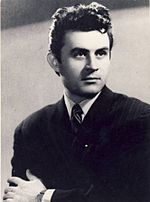Anatol E. Baconsky, Date of Birth, Place of Birth, Date of Death
TweetAnatol E. Baconsky
Romanian writerAbout Anatol E. Baconsky
- Anatol E.
- Baconsky (Romanian pronunciation: [ana'tol ba'konsci]; June 16, 1925 – March 4, 1977), also known as A.
- E.
- Bakonsky, Baconschi or Baconski, was a Romanian modernist poet, essayist, translator, novelist, publisher, literary and art critic.
- Praised for his late approach to poetry and prose, which transgresses the genres and introduces an aestheticized, original and progressively dark perspective to Romanian literature, he was also criticized for his early commitment to Socialist Realism and communism.
- Much of his work belongs to the field of travel literature, recording his experiences in the Eastern Bloc, the Far East and Soviet Union, and finally Central Europe.
- He was also a critically acclaimed translator of foreign works, including the Mahabharata and poems by Jorge Semprún, Artur Lundkvist and others, the author of world literature anthologies, and the editor of monographs on Romanian and foreign painters. After a brief affiliation to Surrealism in the 1940s, Baconsky was a prominent supporter of the communist regime who joined its cultural establishment.
- In the mid-1950s, he grew disillusioned with communist guidelines—this attitude was notably manifested in his activity as editor of the Cluj-based magazine Steaua (where he reacted against the prevailing censorship), his 1972 public reaction against the norms imposed by the Nicolae Ceausescu regime, and his samizdat novel Biserica neagra ("The Black Church").
- Having spent much of final years in Austria and West Berlin, where he became a critic of consumerism, Baconsky died in Bucharest, a victim of the 1977 earthquake. Anatol E.
- Baconsky was the elder brother of Leon Baconsky, a literary historian and academic, and the father of writer and diplomat Teodor Baconschi.
Read more at Wikipedia
See Also
- Famous People's Birthdays on 16 June, Ukraine
- Famous People's Birthdays in June, Ukraine
- Famous People's Birthdays on 16 June, Romania
- Famous People's Birthdays in June, Romania
- Famous poet's Birthdays on 16 June, Ukraine
- Famous poet's Birthdays in June, Ukraine
- Famous translator's Birthdays on 16 June, Ukraine
- Famous translator's Birthdays in June, Ukraine
- Famous literary critic's Birthdays on 16 June, Ukraine
- Famous literary critic's Birthdays in June, Ukraine
- Famous linguist's Birthdays on 16 June, Ukraine
- Famous linguist's Birthdays in June, Ukraine
- Famous poet's Birthdays on 16 June, Romania
- Famous poet's Birthdays in June, Romania
- Famous translator's Birthdays on 16 June, Romania
- Famous translator's Birthdays in June, Romania
- Famous literary critic's Birthdays on 16 June, Romania
- Famous literary critic's Birthdays in June, Romania


 Date of Birth:
Date of Birth:  Place of Birth: Konovka, Chernivtsi Oblast, Ukraine
Place of Birth: Konovka, Chernivtsi Oblast, Ukraine